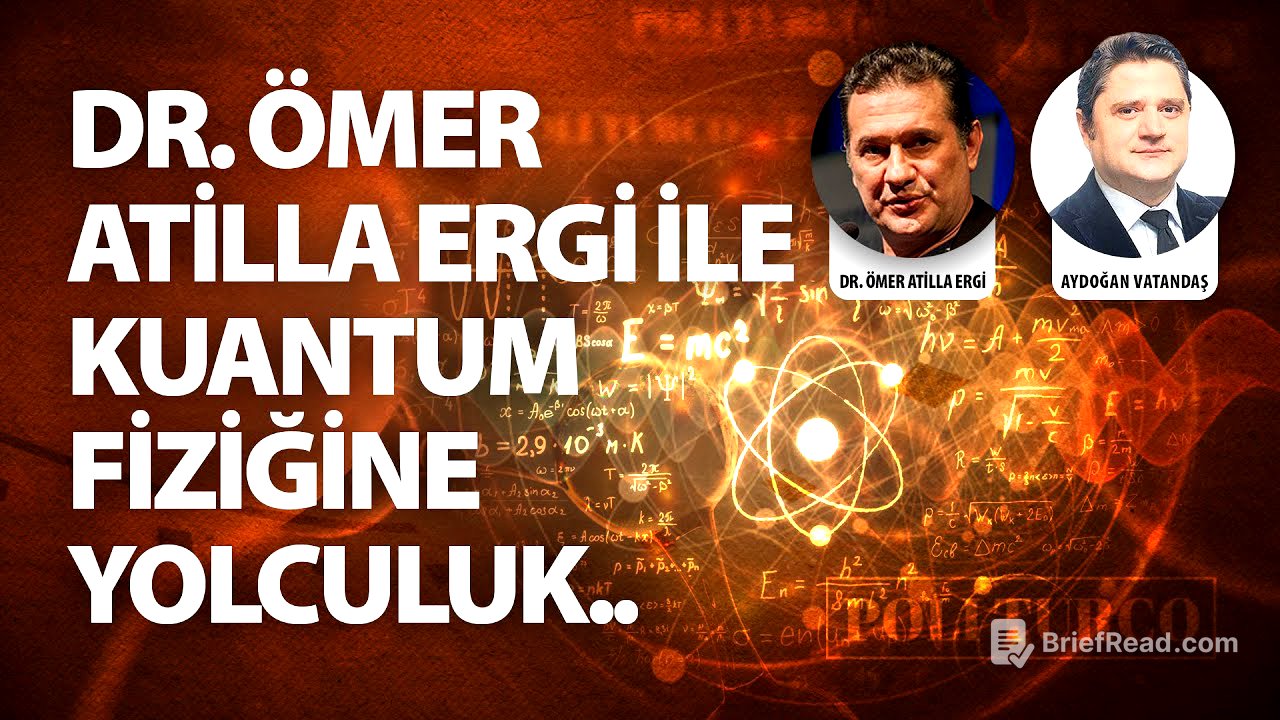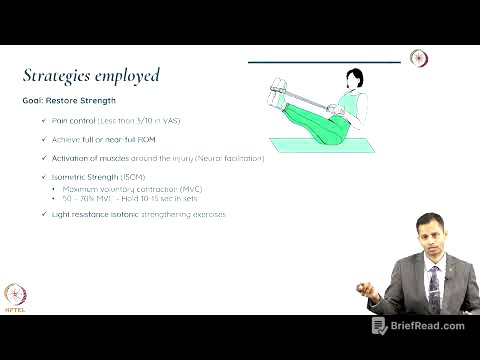TLDR;
This video features a discussion with Dr. Ömer Atilla Ergi about quantum physics and its implications for both theistic and atheistic perspectives. The conversation covers the basics of quantum physics, the increasing interest in the field, and the relationship between the macro and micro worlds. It also explores the concept of infinity, the origin of the universe, and the importance of balancing scientific advancements with spirituality.
- Quantum physics studies subatomic particles and their behaviors, leading to discussions about its compatibility with divine systems.
- The pursuit of understanding the smallest particles is driven by the desire to comprehend the universe's origins and workings.
- The concept of infinity in mathematics and physics is explored, questioning whether it can exist in a tangible sense.
- The Big Bang theory and alternative theories like the superfluid theory are discussed in relation to the universe's creation.
- Balancing scientific progress with spirituality is crucial to avoid losing sight of faith and belief.
Introduction to Quantum Physics [0:09]
Dr. Ömer Atilla Ergi defines quantum physics as the branch of science focused on studying the smallest particles of matter and their functions within the subatomic world. It examines how these particles form, maintain balance in the macro universe, and contribute to overall equilibrium. The increasing interest in quantum theory among physicists is attributed to the natural progression of scientific inquiry, moving from macro-level observations to the study of fundamental components like cells, DNA, and subatomic particles.
The Study of Matter and the Human Perspective [3:22]
The study of matter at the quantum level, including the examination of monomers, polymers, and the bonding of atoms, is beneficial for understanding human composition and developing treatments for diseases. However, Dr. Ergi suggests that understanding a human requires a holistic approach, considering both the material and non-material aspects. The ultimate goal of investigating the smallest particles is to understand the universe's origin, composition, and functionality.
The Atom and Quantum Uncertainty [8:24]
The discussion touches on the structure of the atom, including electrons, protons, neutrons, and quarks, and the concept of "clank length," the smallest reachable distance within an atom. Quantum physics investigates the uncertainty principle, where the exact location of an electron cannot be precisely determined due to its rapid movement. Despite this uncertainty, the underlying order and perfection in systems like DNA suggest a deeper level of organization.
Macro vs. Micro Worlds and the Big Bang Theory [12:49]
The macro and micro worlds operate under different principles, leading to questions about their compatibility. The Big Bang theory suggests a beginning for the universe, aligning with the Quranic concept of the universe's constant expansion. Quantum physics introduces a bottleneck when examining the universe's origin, proposing a pre-self state and the emergence of a singularity, which implies creation from nothing.
Alternative Theories: String Theory and Superfluid Theory [16:59]
String theory suggests that tiny, invisible strings existed before the Big Bang, concentrating energy in the void. The superfluid theory proposes that the void is composed of superfluid, offering a potential explanation for the universe's formation. This theory resonates with a verse in the Quran (Surah Hud, 7) stating that God's throne was on water before creating the earth and heavens.
Science, Faith, and the Interpretation of Knowledge [19:26]
Scientific and technological advancements should bring people closer to faith and belief by revealing the magnificent system of the universe. The interpretation of scientific findings depends on one's perspective, and focusing solely on the material aspects without recognizing the deeper meaning can be problematic. The universe is like a book, and while science helps examine it in detail, understanding its content and meaning is crucial.
The Concept of Infinity in Mathematics and Physics [21:25]
The concept of infinity is explored in mathematics and physics, questioning whether it can exist in a tangible sense. While mathematical intervals can be infinitely divided, there are different types of infinities. In physics, there are limits to how small matter can be, such as the Planck length and the limitations proposed by string theory. True infinity is not possible for things in series, as everything has a beginning and an end.
Philosophical Perspectives on Infinity and Creation [24:02]
The human mind struggles to comprehend infinity, as illustrated by examples like the Bottomless Pit and Hilbert's Hotel. Islamic philosopher Elkindi argues that infinity is not possible in the real sense because it cannot decrease or increase. God, however, is absolutely infinite because He is not made of parts and is not bound by time and space. The universe and everything in it were created from nothing by God.
Causality, Eternal Life, and the Nature of Matter [28:38]
The argument that everything needs a beginning, including the universe, leads to the question of what initiated the creator. The concept of causality suggests that events follow each other in a chain, and the creator cannot be added to that chain. While the human mind cannot grasp infinity philosophically, eternal life in the afterlife may be possible through a different understanding of matter and time. Human beings may derive their infinity from God, who has true infinity.
Particles, Antimatter, and the Balance of Existence [33:30]
Particles are created with their antimatter counterparts, and in the quantum vacuum, particles can suddenly come into being and disappear. Energy can transform into matter, as described by Einstein's equation E=mc². When matter comes into existence, it always appears with its antimatter in pairs, which then cancel each other out. This creation in pairs is seen as a significant scientific observation.
The Future of Science and the Importance of Balance [35:29]
Science is constantly evolving, and advancements are expected to accelerate with the growing number of people working in scientific fields. It is crucial to maintain a balance between scientific research and spirituality, like a double-winged bird, to avoid losing one's way. Valuing both science and spirituality is essential for a comprehensive understanding of the universe and our place in it.

![[Digimon Podcast] LiT Episode 68 - The Ugly Stick Goes DigiMental](https://wm-img.halpindev.com/p-briefread_c-10_b-10/urlb/aHR0cDovL2ltZy55b3V0dWJlLmNvbS92aS9hRDlVc0hOX29SYy9ocWRlZmF1bHQuanBn.jpg)







